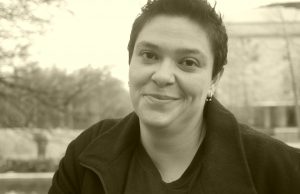Speaking Truth to Power: “You Are What You Eat”
By Ashante Reese
The buzz surrounding the name of the recently-opened Fat Ho Burgers in Waco has spread beyond the small town in central Texas. As Tamura Lomax suggested in her article on the The Feminist Wire, much of it focuses on the owner, Lakita Evans, a 23-year-old black woman who gave up nearly everything to open this restaurant.
While I like to see stories about people prospering, the attention on Lakita Evans as a black woman lifting herself up from poverty obscures the way the name of the restaurant is a method of speaking truth to power. “Speaking truth to power” directly challenges the accuracy of powerful beliefs, ideas or actions that have long been ingrained as right or normative. In Lakita Evans’ case, the name of her restaurant speaks to the power of the word “ho,” and directly challenges it as a derogatory term often associated with black women by putting it in the public for all people to consume. Lakita Evans’ name choice gets us thinking about what “ho” really means, much the same way queer theorists do when questioning the authority and power of heteronormative practices.
In the 1970s, theorists began challenging the overwhelmingly negative connotations associated with the word “queer” by critiquing the construction of heterosexuality as “normal” and, conversely, other sexualities as “deviant.” These theorists—mostly (if not all) white—began the process of changing the meaning of the word queer, beginning in their academic circles first and then permeating public spaces.
Since Teresa de Lauretis coined the term “queer theory” in 1990, the word “queer” has been appropriated to signify a direct challenge to the belief that heterosexuality is right and everything else is wrong. It is a word—a movement—with which many inside and outside academia are proud to be associated. Queer has penetrated pop culture and public consciousness, and if you look around there is evidence of queering any number of things, even Christianity.
Perhaps this won’t happen with the word “ho,” and I’m not suggesting that it will. However, I find it interesting that “queer,” when used by mostly white privileged academics, was able to penetrate both academic and public consciousness as a contestation to what is considered “normal.” Many people—at least in academic circles and in some public areas—would think twice about using the word queer in a pejorative fashion. In my circle of friends, queer is tossed around with pride as an identity marker that symbolizes a direct challenge to anything or anyone that thinks non-heterosexual people are inferior. Why hasn’t there been serious consideration that this could happen with the word “ho?”
The differences between the folks who initially developed queer theory and Lakita Evans are they were white and she is black, they were academics and she is not and (perhaps more importantly) people took them seriously and, unfortunately, Lakita Evans has not been taken seriously.
Undoubtedly, the word “ho” may conjure certain images in people’s minds. As many feminist theorists have pointed out, “ho” has been used to denigrate and objectify black women in multiple ways—from Don Imus calling basketball players “nappy headed hos” to rappers using the word in their lyrics to call into question the respectability of women. In her article, Lomax points to the metaphorical consumption of the black female body as a way of analyzing the attention given to this restaurant. This is definitely part of the reason why people are not taking Lakita Evans seriously. She has brought a controversial term into public space outside of its normal and acceptable uses (the primary appropriate space currently being rap music), and people are unable to disassociate her as a person from the term that is usually used to describe other women who look like her—and this is unfortunate.
The phrase “you are what you eat” that appears on the Fat Ho Burgers menu is ingenious. It’s witty. It’s funny. And yet, while people have noted Evans’ use of the phrase on her menu as clever, most have ignored how powerful it could be as a subversive tool. It’s a phrase Eric Schlosser uses in the introduction to Fast Food Nation as he critiques the fast food industry’s powerful influence and exploitative practices. “You are what you eat” is already a precedent in this country. If you eat organic food you are healthy and environmentally conscious. If fast food is a staple in your diet, you areunhealthy and uncritical in your food choices.
We see this messaged in advertisements, critiqued in academic literature, and evident in people’s conspicuous consumption patterns. Fat Ho Burgers challenges “ho” as a term but it also challenges “you are what you eat” by pointing out to customers that—if they are what they eat—upon consuming a Fat Ho Burger, they are now whatever types of “ho” they have chosen to consume.
If Lomax is right about the historical and present-day racialized meanings of the word “ho” (and I think Lomax is on to something), then the phrase “you are what you eat” is even more powerful in this context. Perhaps Evans was only attempting to be funny. However, I think if we look at her ingenuity as seriously as we consider her economic status and racial identity, if we actually think beyond the titillation of the name, we can see that she is challenging stereotypes. She is subverting the norm of black women being labeled “hos” by giving everyone an opportunity to be a “ho” through consumption, she is doing something very similar to what white academics initially did with the word “queer”: She is speaking truth to power.
_________________________________________________________________
 Ashante´ Reese is a PhD student in anthropology at the American University in Washington, D.C. Her primary research interests include how the intersections of race, gender, and class are constructed (or ignored) in health research and prevention programs, theorizing and writing about children as “social actors,” and bridging the gap between “public” and “academia.”
Ashante´ Reese is a PhD student in anthropology at the American University in Washington, D.C. Her primary research interests include how the intersections of race, gender, and class are constructed (or ignored) in health research and prevention programs, theorizing and writing about children as “social actors,” and bridging the gap between “public” and “academia.”




1 Comment